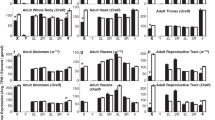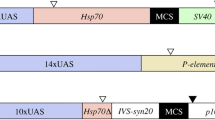Abstract
We describe the cloning and characterization of a new gene family of adenylyl cyclase related genes in Drosophila. The five adenylyl cyclase-like genes that define this family are clearly distinct from previously known adenylyl cyclases. One member forms a unique locus on chromosome 3 whereas the other four members form a tightly clustered, tandemly repeated array on chromosome 2. The genes on chromosome 2 are transcribed in the male germline in a doublesex dependent manner and are expressed in postmitotic, meiotic, and early differentiating sperm. These genes therefore provide the first evidence for a role for the cAMP signaling pathway in Drosophila spermatogenesis. Expression from this locus is under the control of the always early, cannonball, meiosis arrest, and spermatocyte arrest genes that are required for the G2/M transition of meiosis I during spermatogenesis, implying a mechanism for the coordination of differentiation and proliferation. Evidence is also provided for positive selection at the locus on chromosome 2 which suggests this gene family is actively evolving and may play a novel role in spermatogenesis.
Similar content being viewed by others
Author information
Authors and Affiliations
Additional information
Received: 26 September 1999 / Accepted: 27 October 1999
Rights and permissions
About this article
Cite this article
Cann, M., Chung, E. & Levin, L. A new family of adenylyl cyclase genes in the male germline of Drosophila melanogaster . Dev Gene Evol 210, 200–206 (2000). https://doi.org/10.1007/s004270050304
Issue Date:
DOI: https://doi.org/10.1007/s004270050304




